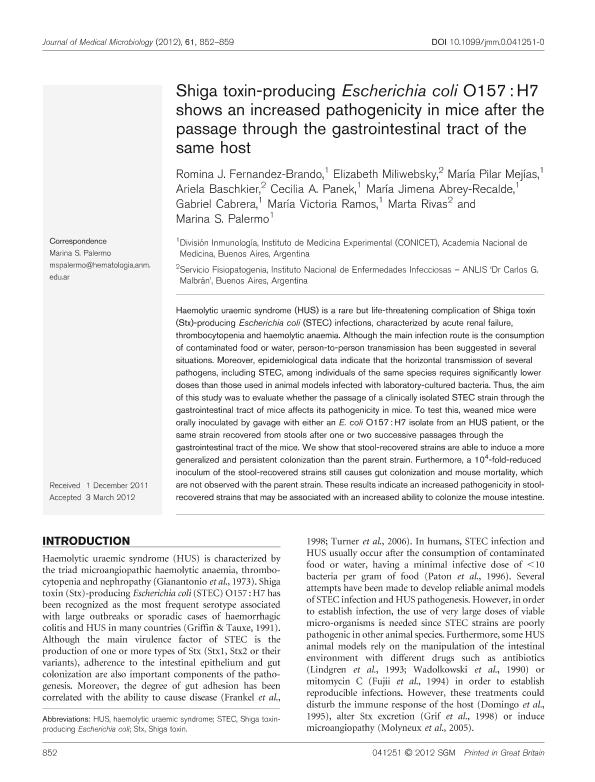Artículo
Shiga toxin-producing Escherichia coli O157: H7 shows an increased pathogenicity in mice after the passage through the gastrointestinal tract of the same host
Fernández Brando, Romina Jimena ; Miliwebsky, Elizabeth; Mejias, María Pilar
; Miliwebsky, Elizabeth; Mejias, María Pilar ; Baschkier, Ariela; Panek, Cecilia Analía
; Baschkier, Ariela; Panek, Cecilia Analía ; Abrey Recalde, Maria Jimena
; Abrey Recalde, Maria Jimena ; Cabrera, Gabriel Gustavo
; Cabrera, Gabriel Gustavo ; Ramos, Maria Victoria
; Ramos, Maria Victoria ; Rivas, Marta; Palermo, Marina Sandra
; Rivas, Marta; Palermo, Marina Sandra
 ; Miliwebsky, Elizabeth; Mejias, María Pilar
; Miliwebsky, Elizabeth; Mejias, María Pilar ; Baschkier, Ariela; Panek, Cecilia Analía
; Baschkier, Ariela; Panek, Cecilia Analía ; Abrey Recalde, Maria Jimena
; Abrey Recalde, Maria Jimena ; Cabrera, Gabriel Gustavo
; Cabrera, Gabriel Gustavo ; Ramos, Maria Victoria
; Ramos, Maria Victoria ; Rivas, Marta; Palermo, Marina Sandra
; Rivas, Marta; Palermo, Marina Sandra
Fecha de publicación:
06/2012
Editorial:
Society for General Microbiology
Revista:
Journal Of Medical Microbiology
ISSN:
0022-2615
Idioma:
Inglés
Tipo de recurso:
Artículo publicado
Clasificación temática:
Resumen
Haemolytic uraemic syndrome (HUS) is a rare but life-threatening complication of Shiga toxin (Stx)-producing Escherichia coli (STEC) infections, characterized by acute renal failure, thrombocytopenia and haemolytic anaemia. Although the main infection route is the consumption of contaminated food or water, person-to-person transmission has been suggested in several situations. Moreover, epidemiological data indicate that the horizontal transmission of several pathogens, including STEC, among individuals of the same species requires significantly lower doses than those used in animal models infected with laboratory-cultured bacteria. Thus, the aim of this study was to evaluate whether the passage of a clinically isolated STEC strain through the gastrointestinal tract of mice affects its pathogenicity in mice. To test this, weaned mice were orally inoculated by gavage with either an E. coli O157: H7 isolate from an HUS patient, or the same strain recovered from stools after one or two successive passages through the gastrointestinal tract of the mice. We show that stool-recovered strains are able to induce a more generalized and persistent colonization than the parent strain. Furthermore, a 10 4-fold-reduced inoculum of the stool-recovered strains still causes gut colonization and mouse mortality, which are not observed with the parent strain. These results indicate an increased pathogenicity in stool-recovered strains that may be associated with an increased ability to colonize the mouse intestine.
Palabras clave:
Stec
,
Hus
,
Shiga Toxin
Archivos asociados
Licencia
Identificadores
Colecciones
Articulos(IMEX)
Articulos de INST.DE MEDICINA EXPERIMENTAL
Articulos de INST.DE MEDICINA EXPERIMENTAL
Citación
Fernández Brando, Romina Jimena; Miliwebsky, Elizabeth; Mejias, María Pilar; Baschkier, Ariela; Panek, Cecilia Analía; et al.; Shiga toxin-producing Escherichia coli O157: H7 shows an increased pathogenicity in mice after the passage through the gastrointestinal tract of the same host; Society for General Microbiology; Journal Of Medical Microbiology; 61; 6; 6-2012; 852-859
Compartir
Altmétricas



